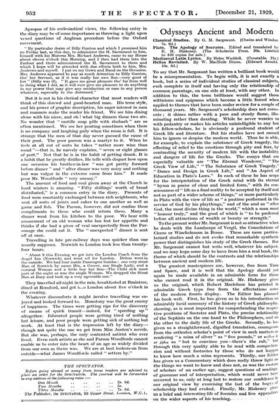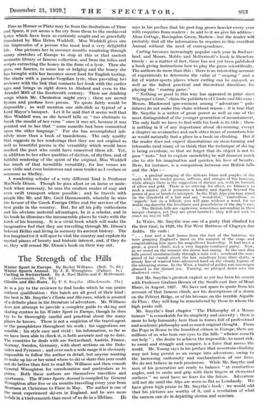Odysseys Ancient and Modern
To say that Mr. Sargeaunt has written a brilliant book would be a misrepresentation. To begin with, it is not exactly a book, but a series of individual studies of classical subjects, each complete in itself and having only the relationship of
common parentage, on one side at least, with any other. In addition to this, the term brilliance would suggest those witticisms and epigrams which become a little forced when applied to themes that have been under review for a couple of thousand years. Mr. Sargeaunt's scholarship does not cows- cate ; it shines rather with a pure and steady flame, illu- minating rather than dazzling. While he never wearies us with pedantry or makes his articles unintelligible to any but his fellow-scholars, he is obviously a profound student of Greek life and literature. But his studies have not caused him to ignore or despise the modern world. Thus he is able, for example, to explain the substance of Greek tragedy, the effecting of relief to the emotions through pity and fear, by contrasting the security of modern life with the instability and dangers of life for the Greeks. The essays that are especially valuable are " The Eternal Wanderer," " The Greek View of Life," " The Substance of Greek Tragedy," " Dance and Design in Greek Life," and " An Aspect of Education in Plato's Laws." In each of these he has scope for the interpretation of the Greek mind with its eternal " hymn in praise of clear and limited form," with its con- sciousness of " life as a final reality to be accepted by itself and not as part of a wider scheme of things," or more particularly in Plato with the view of life as " a pastime performed in the service of God by his playthings," and of the soul as " after God, the most divine thing in the world," which a man must " honour truly," and the good of which is " to be preferred before all attractions of wealth or beauty or strength."
To the present writer Mr. Sargeaunt is not so attractive when he deals with the Landscape of Vergil, the Consolations of
Cicero or Winckelmann in Rome. These are more particu-
larized studies and do not evoke that remarkable synthetic power that distinguishes his study of the Greek themes. But Mr. Sargeaunt cannot but write well, whatever his subject, and •ve may hope some day to have from him a real book, the theme of which should be the contrasts and the relationships between ancient and modern life.
The greatest masterpieces are, however, free from Time and Space, and it is well that the Apology should yet again be made available in an admirable form for those who cannot read it in the original. Mr. Blakeney gives us the original, which Robert Maelehose has printed in admirable Greek type free from the affectations sonic of the modern founts display. The Editor has planned his book well. First, he has given us in his introduction an admirably lucid summary of the history of Greek philosophy, showing, as is most important for comprehending the respec- tive positions of Socrates and Plato, the precise relationship of the Sophists on the one hand to the Philosophers, and on the other to the daily life of the Greeks. Secondly, he has given us a straightforward, dignified translation, courageous from the orthodox scholar's point of view in such matters as rendering " a mina of silver " as " five pounds," or arelOar 61 oto Atom as " but to convince you—there's the rub," but through this very quality able to be read with comprehen- sion and without footnotes by those who do not happen to know how much a mina represents. Thirdly, our Editor has given us a Commentary which does really throw light on the things we want to know and does not, as was the custom of scholars of an earlier age, suggest questions of readings, of grammar and of interpretation, which would never have occurred to us, only at long last to restore our confidence in our original view by exorcising the last of the bogy Of scholarship they had evoked. Finally, Mr. Blakeney gives us a brief and interesting. life of Socrates and five appendices
on the wider aspects of his teaching. , - - Free as Homer or Plato maybe from the limitations of Time and Space, it yet seems a far cry from them to the mediaeval lyrics which have been so curiously sought and so gracefully translated by Miss Helen Waddell. Miss Waddell gives one the impression of a person who must lead a very delightful life. One pictures her in summer months wandering through sunny stretches of Europe to stop at this or that ancient monastic library or famous collection, and from the folios and scripts extracting the honey in the form of a lyric. Then she goes, one fancies, to some inn or lodging and the honey she has brought with her becomes sweet food for. English tasting. She starts with a pseudo-Vergilian lyric, thus providing her reviewer with the 'link that connects hei book with the earlier ages and brings us right- down to Abelard and even to the Arundel MSS of the' fourteenth century: • There are drinking songs which Mr. Chesterton might envy ; there are sacred hymns and profane • love poems. To quote fairly would-be impossible ; as well mention one side-dish as typical of a Lord Mayor's banquet. Let it be said that it seems well that Miss Waddell was, as she herself tells us " too obstinate to break the mould of her verse " once it was set, because it was pointed out to her that " some assaults had been committed upon the older language." For she' has accomplished infi- nitely more than a book of translations. The only quality that suggests in her renderings that they are not original as well as 'beautiful poems is the versatility which would have Marked the poet who could •have conceived them all. Yet, in addition to her other qualities of diction, of rhythm, and of faithful rendering of the spirit of the original, Miss Waddell has much of that incredible versatility, for her verses are now virile and even boisterous and anon tender as Lovelace or sensuous as Shelley.
A wandering scholar of a very different kind is Professor MacNeile Dixon. Though he goes afoot or on horse or mule- back when necessary, he uses the modern modes of easy and even swift transport where possible ; and he travels with people like Mr. and Mrs. Cecil Harmsworth, whereby he wins the favour of the Greek Foreign Office and the services of the best guide in the country. But, for all his jolly enthusiasm and his obvious material advantages, he is a scholar, and in his book he illumines the innumerable places he visits with the torch of his learning. It is a vivid book which will make the imaginative feel that they are travelling through Mr. Dixon's beloved Hellas and living in memory its ancient history. The less imaginative it will spur to visit the country and explore its myriad places of beauty and historic interest, and, if they do so, they will reread Mr. Dixon's book on their way out.



































 Previous page
Previous page